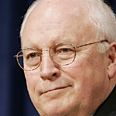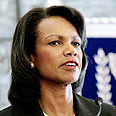

Intelligence which led to IDF strike in Syria sparks debate in US
New York Times reports that Vice President Cheney, conservative hawks portray Israeli intelligence as credible, argue it should cause US to reconsider its diplomatic overtures to Syria, North Korea. By contrast, Secretary of State Rice, her allies say they do not believe that intelligence presented so far merits any change in American diplomatic approach
At issue is whether intelligence that Israel presented months ago to the White House — to support claims that Syria had begun early work on what could become a nuclear weapons program with help from North Korea — was conclusive enough to justify military action by Israel and a possible rethinking of American policy toward the two nations.
According to the report, Vice President Dick Cheney and conservative hawks in the administration portray the Israeli intelligence as credible and argue that it should cause the United States to reconsider its diplomatic overtures to Syria and North Korea.
By contrast, Secretary of State Condoleezza Rice and her allies within the administration have said they do not believe that the intelligence presented so far merits any change in the American diplomatic approach.
“Some people think that it means that the sky is falling,” a senior administration official told the New York Times. “Others say that they’re not convinced that the real intelligence poses a threat.”
Besides Rice, officials said that Defense Secretary Robert Gates was cautious about fully endorsing Israeli warnings that Syria was on a path that could lead to a nuclear weapon. Others in the Bush administration remain unconvinced that a nascent Syrian nuclear program could pose an immediate threat.
According to the report, it has long been known that North Korean scientists have aided Damascus in developing sophisticated ballistic missile technology, and there appears to be little debate that North Koreans frequently visited a site in the Syrian desert that Israeli jets attacked September 6.
Where officials disagree is whether the accumulated evidence points to a Syrian nuclear program that poses a significant threat to the Middle East.
It was also reported that Cheney and his allies have expressed unease at the decision last week by President Bush and Rice to proceed with an agreement to supply North Korea with economic aid in return for the North’s disabling its nuclear reactor.
Those officials argued that the Israeli intelligence demonstrates that North Korea cannot be trusted. They also argue that the United States should be prepared to scuttle the agreement unless North Korea admits to its dealing with the Syrians.
According to the report, last week Rice and her chief North Korea negotiator, Christopher R. Hill, made the case to President Bush that the United States faced a choice: To continue with the nuclear pact with North Korea as a way to bring the secretive country back into the diplomatic fold and give it the incentive to stop proliferating nuclear material; or to return to the administration’s previous strategy of isolation, which detractors say left North Korea to its own devices and led it to test a nuclear device last October.
Cheney and Stephen J. Hadley, the national security adviser, also attended the meeting, administration officials said.
Last week, the New York Times reported, Turkish officials traveled to Damascus to present the Syrian government with the Israeli dossier on what was believed to be a Syrian nuclear program, according to a Middle East security analyst in Washington.
The analyst said that Syrian officials vigorously denied the intelligence and said that what the Israelis hit was a storage depot for strategic missiles.















